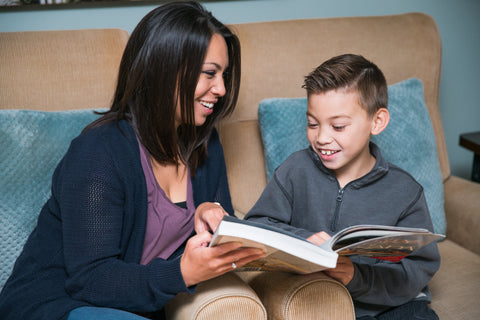The novel coronavirus, or Covid-19, isn't just making people sick with flu-like symptoms, it’s also giving many kids and parents a severe case of cabin fever. During spring break, many schools made the decision to extend the break for another week. But during the extension, school districts decided to extend the closures for an additional two weeks out of an abundance of caution. Businesses also decided to ask many of their employees to take time off or work from home to prevent spreading the disease to co-workers.
After nearly two weeks of being home, cabin fever is starting to settle in with many families. With schools still trying to prepare lessons children and teens can work on while at home, there will be plenty of downtime until electronic classrooms are ready to go.
Thankfully, being quarantined because of coronavirus doesn’t mean things have to be boring. There are plenty of activities parents and kids can do together that are both educational and fun. Of course, the activities on this list might be limited to where you live, but most them should be things that every family can do
Play Some Board Games
Yes, I know. There are just some families who should never play board games together. But if you’re a family who isn’t extremely competitive or full of sore losers, board games can be a great way to pass the time and learn a few things as well.
Games like Scrabble, Boggle, and Balderdash are great for working on building a vocabulary, Monopoly is perfect for teaching kids about math and money, and Jenga can teach your kids about physics.
Of course, playing games can also teach social skills like teamwork and communication. These are skills that are critical for both kids and adults to learn.
Practice Handwriting Skills
If you’re not a doctor, you shouldn’t have handwriting like one. With all the extra time your kids have, now is a great time to work on your penmanship. There are numerous resources available to teach kids how to write numbers and letters. For older kids, teaching them to write in cursive is the next best thing.
Just because we are a society that relies on keywords to write everything, it’s still incredibly important to be able to write legibly when required.
Try Simple Science Experiments
No need to go out to the stores and buy your kid a chemistry set. There are many science experiments you can do in your home already with things you probably keep on hand. As science fair projects are likely not going to happen this year, there’s no reason you can’t have a few science lessons during the time off.
For example, create a homemade volcano using baking soda and vinegar. Add a little red food coloring for realistic lava. Teach your kids about air pressure simply by heating a little water inside an aluminum can then turning it upside down in a bowl of ice water.
Remember to teach your kids to be safe when doing science and to wear proper hand and eye protection, just like scientists in a laboratory. And if you want something even better, try out some science projects you can eat.
Start a Flower or Vegetable Garden
Have some extra space in your backyard or a few planter boxes? Teach your kids about plant science and start a garden. Do some research with your kids about which flower or vegetables will grow easily in your zone and this time of the year. Give your kids the responsibility of watching over the seedlings and watering everything you plant.
It’s a great way to teach kids about photosynthesis and how many foods grow before they end up at the grocery store.
Make Music Together
If you’re a musical family and have instruments around the house, or you’re a great singer, have music time with your family. It’s easy to make instruments of your own at home with a few things you probably already have lying around the house. Making your own instruments gives you and your kids the opportunity to be creative and do some arts & crafts.
For music, stick with children’s songs everyone knows and encourage them to play and sing along. If you’re not very musically inclined, create a playlist on streaming sites like YouTube or even on music apps like Spotify.
Storytime is the Best Time
With younger kids spending so much time looking at electronic devices, it’s difficult to get kids to have an appreciation for reading time. Making sure young kids have an appreciation for reading and books is critical. The best way to do this is to designate a reading time with your kids. Read a classic children’s story to them during the day or right before bed. Better yet, you can lead by example and schedule a time when you and your kids all read different things together. Reading is a fantastic habit to have and is also great for your brain.
Build Creativity with Building Blocks
Kids learn better when they’re actively engaged and working with their hands. Building blocks like Legos are perfect for letting kids be creative and build anything from small towns, vehicles, or my personal favorite, spaceships!
If you want to be an awesome parent, you can purchase special themed kits from Lego and you and your kids can build sets based on your favorite movies or comic book series. These sets tend to be a bit on the pricey side so save these for special occasions.
Have a Movie Night
As movie theaters are not an option to make sure we all practice social distancing, there’s no reason why you can’t bring the movie theater to you! Go all out for family movie night with classic popcorn buckets, pizza, and traditional movie theater chocolates and candies.
With so many streaming services available, it shouldn’t be hard to find a movie your whole family can agree to watch together. If you run out of movies to watch, there’s always great family friendly and educational content on YouTube you all can watch together.
Backyard Camping
With the warmer months finally arriving, give yourself a reason to air out the camping gear and camp out in the backyard for a night or two. Roast a few marshmallows and tell a few ghost stories, all with the comfort of knowing the bathroom isn’t miles away. Add a telescope and a clear night, and you have the perfect opportunity to do some stargazing.
Of course, you don’t have to stay out with your kids in the tent if you don’t want to. But make sure to make the most of the experience by giving your kids camping snacks and maybe even roast some hot dogs over a fire pit.
Teach Kids Adulting Skills
If you have older kids who can handle a little more responsibility, use the time they’re at home to show them how to do the things they’ll ultimately have to do on their own like cooking, cleaning, making a budget, and basic house maintenance.
Now would be a great time to give kids an appreciation for cooking and teaching them the basics before they’re teenagers and aren’t as willing to learn. Being in the kitchen exposes kids to chemistry and math. They learn to measure out ingredients and when to add those ingredients. Furthermore, they learn recipes they love and learn how to modify them for when they will ultimately need to make them when you’re not around. It’s a great chance to help your kids become a little bit more independent.
Teaching kids about money shows them what it means to be financially responsible. On your next trip to the grocery store, teach them to look at prices and carry a calculator so they can add everything up so you stick to your food budget. Let them make choices on things they want so they can understand expenses.
Regular chores should be a part of every child’s routine. Do your best to make it fun for them so they don’t realize they’re actually learning valuable skills and not just being tasked to clean up around the house. It’s okay to reward them with a treat or even a little cash. The point is to get them to learn how to do it now so they aren’t so clueless when they grow up.
These are just a few things you can mix in to your week when the kids aren’t working on schoolwork. If you’re working from home during this time, you’ll have to balance out your work life with your family life to make sure the kids aren’t getting bored or aren’t being mentally stimulated. If at all possible, make sure your kids are always learning or have opportunities to learn.
What kinds of activities have you and your family done recently? Leave a comment below and share your ideas.




Comments (0)
There are no comments for this article. Be the first one to leave a message!